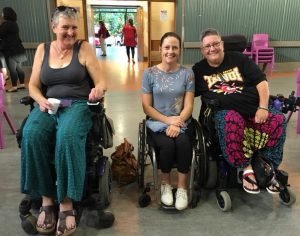Women and disability forum
He waka eke noa. We’re all in this together.
That was the strong message coming the Women and Disability forum held on 13 March.
Dr Huhana Hickey, human rights campaigner, outlined the need for intersectionality – a uniting of women (whether disabled or non-disabled), Māori and Pacific people, and those who identify as LGBTQI – to tackle discrimination.
“We need not to be afraid of activism,” Huhana told the 50-strong audience. “We’ve got to get stronger. Society has to pick up its game.”
Speaker after speaker outlined the challenges disabled women face.
- Only 24% of disabled people are employed, compared to 74% of non-disabled people.
- Disabled women earn, on average, $30,000 less than disabled men.
- A higher number of Māori with disabilities live on less than $15,000 per year.
- Disabled women are much more likely to face abuse, including by ‘carers’ and family.
Next year, the United Nations will examine New Zealand’s compliance with the Convention on the Rights of Persons with Disabilities. “The UN needs to ask difficult questions of New Zealand,” Paula Tesoriero, the Disability Rights Commissioner told the forum. “Disabled New Zealanders have a long way to go to enjoy the rights outlined in the Convention.”
The importance of disabled women telling their own stories, and conveying their diversity beyond statistics, was highlighted by Tanya Black, the general manager of a broadcast and digital company with a focus on disability. She gave the example of Siobhan Fahey, a young girl with cerebral palsy, who was interviewed outlining her love of sport. One media outlet described her as a “Paralympic hopeful” while another cast her as a “Cerebral palsy sufferer”. “Think about the ideology behind those two tag lines,” Tanya said. “It matters that teachers, peers and future employers see her as someone with potential.”
Pia Jane, a disability rights campaigner, gave powerful testimony of lived experience of deaf women’s “language deprivation” – being excluded from education and family communication – and not having the language to report abuse. She said the negative experiences had put “fire in her belly” to change things. The need for the #MeToo campaign to highlight the voices of disabled women was also raised.
One of the most pressing issues facing disabled women is the current End of Life Choice Bill. Speakers and audience members expressed fears that it could lead to euthanasia of disabled people, or people with disabilities deciding to end their lives because of the perception of being a burden. Paula was lobbying hard against the bill extending its scope beyond terminal illness.
Audience members spoke of the lack of accessible accommodation for older people with disabilities. One woman in a wheelchair described her frustrating visits to assess rest homes where she was continually told her wheelchair wouldn’t fit or would damage the walls. Less than 2 per cent of Housing NZ’s stock is accessible. The need for accessibility legislation was raised.
One of Paula’s priorities was to address that lack of data about disabled people, which results in inadequate service delivery. Huhana criticised the census’s limited definition of disability, which meant that District Health Boards’ budgets (based on numbers) would be insufficient. Audience members berated the census’s lack of accessible formats for people with visual impairments. There had been lots of complaints by blind people. MC Nicola Owen urged everyone to spread the word that if people couldn’t complete the census, they should ring Statistics New Zealand who would send someone to help.
Speakers congratulated the Women’s Centre for organising such an accessible forum, saying it was exciting to see so many disabled women participating. The forum could act as a springboard for more sustained action on disability, audience members said. The need for a national women’s disability movement was raised.
Changing attitudes needn’t take years and years, Paula said. “I don’t have the patience.” With digital and social media, she was confident that disabled people could pull off something extraordinary.

